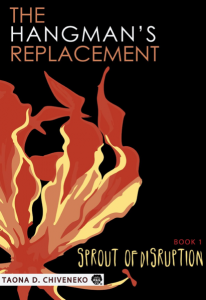
From there the story gets only stranger. As the bizarre plot unfolds, we encounter a carnivorous plant that has been genetically modified to seek out and feed on dead bodies, a lawyer so reclusive that he literally never leaves his office (sliding completed legal briefs under the door to his assistant), a carpenter who is obsessed with death and turns the building of gallows into an art form, a “hanging” judge who has not once made a technical mistake in a decision (a fact that the judge himself realizes may be more sinister than reason for pride), and some powerful men with dark secrets.
The plot is confusing at times, but as the story wends its way through a variety of points of view, including letters, newspaper articles (one of my favorite parts of the book is an ongoing spoof of a sensationalist newspaper), and legal documents, the bits and pieces gradually fall together. Meanwhile, the characters and the situations they find themselves in are so entertaining I wasn’t bothered overmuch by the occasional confusion about what was actually going on.
The book has elements of science fiction, horror, and magical realism. In its straight-faced delivery of an outrageous plot and in its peculiar type of humor, it reminded me quite a lot of Jose Saramago’s novels. It is extremely funny, the humor veering wildly from guffaw-inducing to wry and subtle. The carnivorous plant is described as displaying “cadaver-seeking behavior,” and the rationale for engineering it as follows:
Who decided on the prevailing hierarchy of the food chain anyway? We have had it for so long that we accept it as logic instead of a call to subversion.
Sometimes the humor is just straightforward fun. One character writes to another:
On my way back to Zimbabwe, I may pass through the UK for the International Grammarian Society’s symposium in Northumbria. There is much contention among the members about the theme of this year’s Grand Debate. The majority would like to revisit the society’s hostile position on split infinitives. However, a small but powerful minority is pressing for a definitive position on the distinction between the words “presume” and “assume”.
Yet more than once as I laughed my way through this novel, I was reminded of a quotation by Nikolai Gogol that I came across recently: “The longer and more carefully we look at a funny story, the sadder it becomes.” The humor in The Hangman’s Replacement makes us laugh perhaps to keep us from crying. Again like Saramago, Chiveneko uses bizarre situations and sometimes subtle humor to deliver very deep and often disturbing social and political commentary. I think I would have appreciated the book more if I knew more about Zimbabwe’s history, but even lacking specific knowledge that might have turned story into allegory, I couldn’t help but feel the occasional chill as tragically universal themes emerged.
Chiveneko is a talented writer. Beautiful metaphors and delightful descriptions, while sometimes a little overdone, are some of the best parts of the book.
Describing the reclusive lawyer’s perfectionism, Chiveneko writes:
No word ever made it into his documents until it had been grotesquely tortured and failed to confess to the existence of a better synonym.
Another character is described as he questions a job applicant:
His eyebrows curled and huddled around his eyes. He was about to ask a critical question. He needed all his powers of concentration to process the answer.
I was a little disappointed in the ending. Much of what would have been the denouement in a more conventional novel is here a lengthy explanation, by one or two characters, of what hasn’t already been revealed. And then . . . the book simply stops, leaving us to wait for the next installment to find out how the characters do or do not get themselves out of the bizarre situation in which we leave them. I find these cliff-hanger endings frustrating, but apparently many readers delight in this type of series. In this book, I found the lack of closure troubling. The ending—or lack of one—seemed in some way to suggest that justice is tantalizingly out of reach and that any hope of salvation will simply have to wait.
The Hangman’s Replacement is a long, complex, and challenging novel. But it rewards the reader’s efforts with delightful characters and plenty of laughter, even in the midst of some very disturbing themes.
Links
Amazon
Barnes & Noble
Get an Editorial Review | Get Amazon Sales & Reviews | Get Edited | Get Beta Readers | Enter the SPR Book Awards | Other Marketing Services






















Leave A Comment